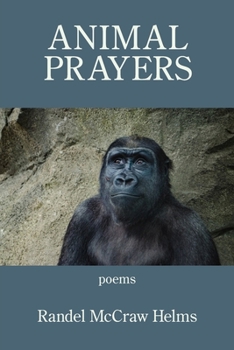Animal Prayers: 25 Poems
Devon Balwit
Mary Oliver writes that the broken heart should "break open and never close again." Helms knows this in his bones, but, like Oliver's best, his poems keep the head intact as well. Of the animals that grace Helms' heart, few are survivors, but it is not the reader's regret that the poems invite, it is the reader's mind, engaged with the understanding that what is lost in these deaths is not merely a fellow creature, but a fellow intelligence, a core of transformative understanding and empathy.
Richard Fenton Sederstrom
The French have a phrase, cri de coeur , a passionate appeal to the heart. These poems attempt a cri d'ame , a reaching out to the soul; speaking to the lifeblood, they are a paean and an elegy to the animal in us all, the soul-filled. With the beings in these poems, we are made to understand that we are the animals of this earth together, and this has consequences: "we are mice, and the night fills with owls." And this is how the world is, but-as the poems suggest so passionately-things don't have to be this way. Helms' poems read as extensions on the rhythms of life, moving from the world that is to the world as we feel it. We are faced with having made this world. What is triangulated clearly from this is the passion of how things could, and so very much ought, otherwise to be.
Alberto Rios
Related Subjects
Poetry




